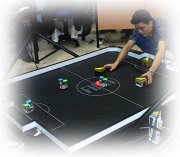organised in cooperation with IEEE Computer Society TC on computational medicine
Funchal, Madeira Island, 29th of February as a part of EIS 2004
Program committee
Peter Kokol, Chair
Margaret Peterson, Co-chair
Bruno Stiglic
Milan Zorman
Ryuchi Yamamoto
Robert Smith
Ana Isabel Cardoso
Mitja Lenič
Petra Povalej
There are two large problems in the health care and nursing process: first the increasing costs and second the "hidden knowledge in enormous large medical databases. The conventional medical and statistical approaches do not solve these problems, thereafter intelligent system are becoming more and more popular.
They are used for data mining, to discover relations, hidden knowledge, laws and fundamentals. Intelligent hybrid systems, data analysis and knowledge extraction techniques are the recent trend in many medical applications. Neural networks, evolutionary programming, rough sets, decision networks, adaptive agents are combined in a coherent environment that enable to analyse and mine knowledge from large data warehouses containing incomplete and noisy data. The advantage of intelligent tools is that they can suggest a variety of very "wild and crazy" ideas. These ideas extend beyond conventional thinking, and possibly represent or at least indicate new directions.
But intelligent system evolution and design is a complicated process. Not so long ago, it has been regarded as an art and it is still a long way to go to be fully recognised as an engineering discipline. In addition, the size and complexity of intelligent systems is growing dramatically during the last decades. As the requirements for, and dependencies on them is becoming more demanding thus increasing complexity, the possibility of crises from failure increases. These failures can range from simple inconvenience to major economic damages and loss of lives.
Thereafter the mini symposium will focus first
- on novel hybrid approaches (novel ways of integrating neural networks, rough sets, evolutionary programming, agent technologies, decision matrices),
- new design methodologies and heterogeneous computing.
- Solutions to the hard IS/data mining problems like ortogonality, reducing the number of iterations needed for near-optimal solutions
- using the chaos theory
- the problem of noisy and incomplete data
- Many intelligent systems are not successful, but literature only reports success stories. The aim of the one of the session will be to present pitfalls of medical intelligent system design and application and the reasons behind
The mini - symposium session will consist of invited and regular papers followed by lively discussions that will be recorded. The presented papers and the paper resulting from the discussions will be published as a special issue of a recognised international journals (International Journal of Medical Informatics or Journal of Medical Systems)
Prospective authors are thought to send papers limited to 6 pages electronically to Kokol@uni-mb.si by 1st of November 2003.





